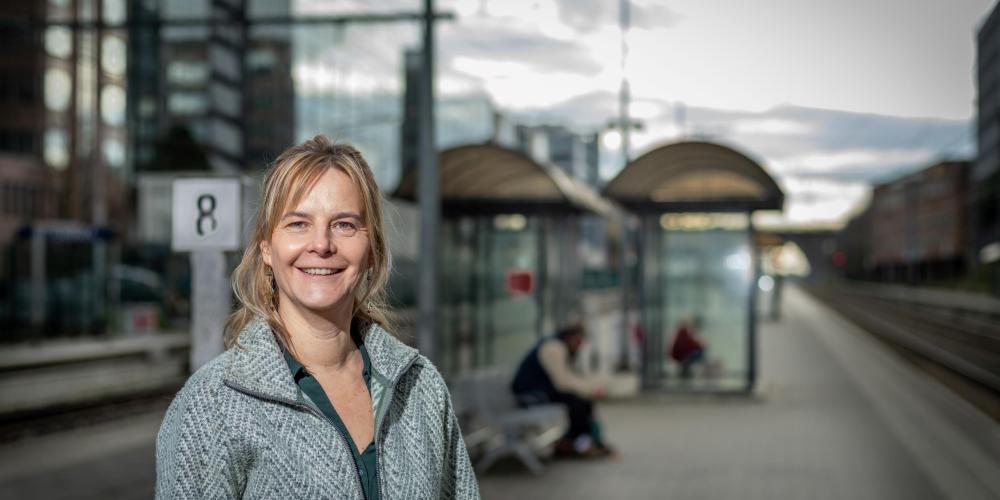
A month without driving? You’d better believe it! Along with all the other 30 Dagen Minder Wagen participants across Flanders, VUB is contributing to a 350,000 km reduction in car travel in June. We hear more from ambassador Prof Cathy Macharis.
The 30 Dagen Minder Wagen challenge is simple: drive your car as little as possible in June, in your commute and in your free time. Do you want to do your bit? Register here and join the VUB team! After signing up, make sure you fill in the survey to get great benefits from partners such as Cambio, Blue-bike and De Lijn. This year the campaign is collaborating with the Scone app, which participants can download to join the 30 Dagen Minder Wagen Scone community. It’s a fun way to make mobility habits more sustainable, to motivate others, and provide authorities with more data to work with.
Not quite convinced? Then let us give the floor to Prof Cathy Macharis, founder of the research group Mobilise at our Faculty of Economics. Cathy is passionate about sustainability and our slow, but hopefully steady, transition to a more sustainable world. Her research has been published in many prestigious scientific journals and popularised in books on mobility and sustainability. At the same time, she is involved in policymaking, as she chairs the Brussels Mobility Commission and is a member of the federal government’s High Committee on Just Transition. In short, she’s a multi-faceted and strong ambassador for a more sustainable VUB campus!
Cathy, can you briefly explain the research you’re conducting in the Mobilise research group?
Our mission with Mobilise is to accelerate the transition to a sustainable and inclusive mobility system by focusing on analysing sustainability and mobilising people. What does this involve? First, we analyse what is sustainable by identifying the impact of new concepts and future scenarios. Secondly, we engage as many people as possible in this transition and mobilise them for a more sustainable life. In this way, we gain a better understanding of what matters to stakeholders. We have also recently started to collaborate with three groups from the Brussels School of Governance (VUB) in the research group Advancing Sustainable Transitions, where they contribute mainly with their expertise on sustainability policies.
You are also involved in many committees working on sustainability and mobility. How does your research have an impact on policy in Brussels? What do you think the ideal interaction between research and policy looks like?
Just by looking at the real impact of measures and by developing possible scenarios. But also by providing the government with insight into what matters to all the stakeholder groups. We have developed various methods for that. This knowledge flows through the advisory councils and then we have to hope that the minister picks it up and does something more with it.
How did the 30 Dagen Minder Wagen initiative come about? What’s the aim of the campaign?
A while back, a journalist from De Standaard asked if I could pitch an idea as a resolution for 2022. I put forward my idea of using the car less for the 30 days of June. It was met with great enthusiasm, so we resolved to take the idea further. Shortly afterwards, I stood before the Netwerk Duurzame Mobiliteit to give a presentation where I explained the 30 Dagen Minder Wagen proposal. That was very good timing, as they were just submitting a dossier to the Flemish government to organise such a campaign. We joined forces and created the campaign together. The aim is to encourage, but also kind of challenge, people to literally drive their cars less for 30 days. They can of course still use alternatives such as carpooling or car-sharing. We want to show that you can also get a long way with other, more sustainable means of transport, such as public transport or cycling. Last year, more than 6,000 people took part. This year we’re aiming for an even bigger crowd, and people can also register as a group. So be sure to register for the VUB group on the website!
What sustainable, accessible alternatives to the car do you recommend for our commutes?
There really are lots of alternatives that are sustainable and accessible. You could use your own bike, shared bikes, a scooter or public transport. You can also try out shared cars; Cambio Vlaanderen, for example, is an official partner of our campaign and offers extra benefits to participants. In Brussels, other providers include Poppy and Miles. Lots of colleagues use public transport to get to the VUB Campus Etterbeek: 68% of our employees use trains, buses and trams to get here. On our VUB Health Campus in Jette, the numbers are unfortunately lower. There, 52.71% of people commute by car, because of several factors such as accessibility. But it could be very interesting to share a ride with someone. It saves unnecessary kilometres on the clock and means you can get to know your colleagues better. Did you know that VUB provides a carpooling option? Take a look via this link and sign up for a more companionable commute.
How would you motivate people to take part in 30 Dagen Minder Wagen?
Just do it! Not just for logical reasons like your health and wallet. But also to create change, because your participation can really affect policy, and of course for the fun of it! You can even participate with your VUB colleagues this year, which makes the challenge more enjoyable and achievable. Sustainability remains a key pillar within our university, so this is a unique opportunity to reiterate our commitment to climate and biodiversity.